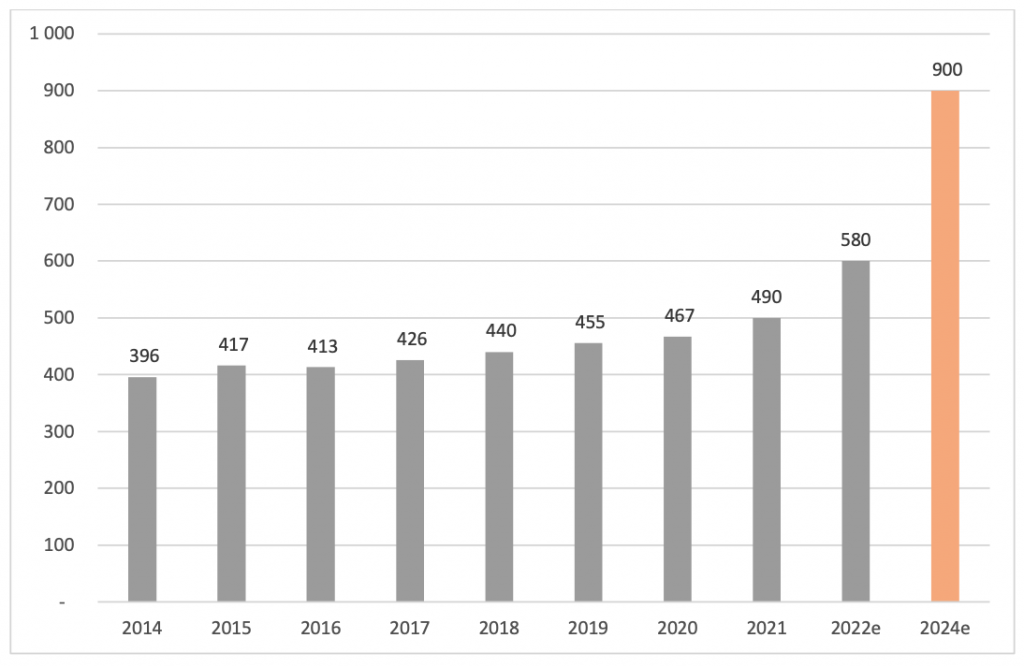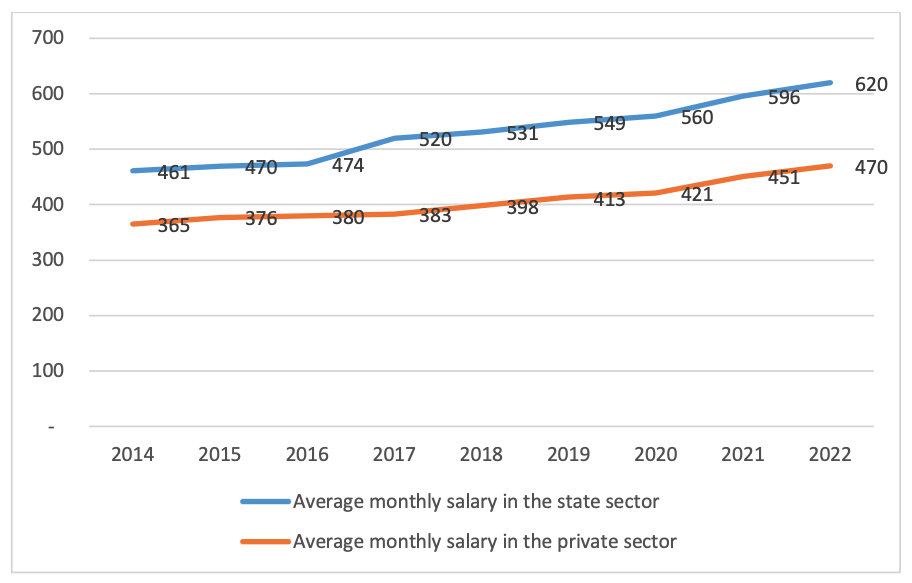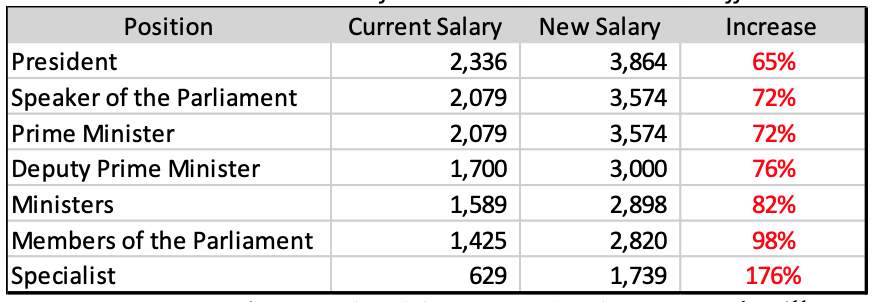Weekly Briefing, Vol. 63. No. 2 (Al) June 2023
Increasing average wages in Albania?! Between narrative, feasibility, and realty
Summary
The consumer price index (CPI) in Albania has been on the rise constantly. As inflation is soaring, the need for higher wages to keep up with the increase in prices has been the center of every discussion. During elections, this topic deviates from the simple economic analysis and melts more into the political discourse. While the minimum wage can be a point of reference for authorities to intervene, the average salary is also thrown into the same debate as something that the government promises to achieve within the next year.
Introduction
During the past decades, having a government job has been the employment dream path for most Albanians, and when analyzing the row data it is realized why. Besides the stability that those jobs provide in terms of the length of the working contract, the salaries appear better than the national average. Not considering that the majority of the ones that apply for a government job do not do it for the salary (extended opportunities are available, to say the least). As of June 2023, the government is still promising to take care of its own. They argue that once this is done, the rest of the private sector will follow.
The draft Law on increasing the average as a “reform”
In late May 2023, the Parliamentary Committee on Laws examined and approved two draft laws proposed by the Ministry of Finance and Economy (MFE), which have as their object the reform of salaries. They take into consideration two aspects, salaries, bonuses, and structures of Independent Constitutional Institutions. This draft law is based: “On the powers to set salaries, other financial treatments and benefits of employees in public administration institutions, as well as the minimum basic salary at the national level.” The MFE argues that through this legal initiative, a complete and deep salary reform starting from the state salary hierarchy and other financial benefits of employees in the state administration will commence. The aim is to make public administration as attractive as possible and to promote innovation and competitiveness.
Besides the rhetoric, there is also a target, bringing the average salary to the level of 900 euros per month. This would start from a part of public administration and should be a policy that aims to help this generation of employees have more dignified salaries, according to the minister. It highlighted the fact that this initiative was undertaken after a deep analysis and the need for salary reform, as the country is moving into a new era of digital transformation and rapid technological advances. For the government, the wage determination systems must match the requirements of the development of the labor market. This salary increase policy for the public administration is expected to extend over two years.[1]
The Prime Minister was even more detailed on the website of the PM’s office where according to him, the categories that benefit will are as below:
– The Central Administration, + 24-61% (about 18,000 employees)
– The Local Administration, + 50 euros (about 25,000 employees)
– The Pre-University Education System, + 23-36% (about 36,570 employees)
– The University Education System, + 20% (about 4,237 employees)
– The Health System, + 26-34% (about 18,858 employees)
– The Armed Forces, + according to rank 4-22% (about 6,756 employees)
– The Republic Guard and the State Police, + 21-35% (about 12,120 employees)
– The Diplomatic Service, +20% increase in salary and +20% increase in the cost of living allowance (about 367 employees)
– Support Workers, who benefit from a 9.3%-17% pay increase (about 9,000 employees).[2]
All were highly welcomed, especially considering that the government is the biggest employer in the country with about 185 thousand people working for the state. However, the rest, namely everyone that works in the private sector had their worries, since this reform does not affect them.
Reactions locally
Following the promise of the PM that the average salary in the country will be 900 euros, there was an immediate reaction from experts. They are skeptical about the realization of this initiative in a relatively short period. The logical thinking is that the budget revenues will increase, therefore, several tax categories will increase, other income categories will be taxed, or certain government expenses will decrease. It is impossible to target e group of employees for a wage increase with a governmental decision. [3] A full reform should encompass all categories, and what is more important, salaries are based on the supply-demand of the market and the productivity they deliver.
Since the government is taking care of its own, it is also calling for private enterprises to raise standards, working conditions, and salaries for their employees as well. Nevertheless, the private sector in a fragmented economy like Albania cannot function as the government wants them to, because in the existing model, authorities can only recommend or suggest, but not impose.
The promise has been described as completely unrealistic by several economic experts.[4] They argue that authorities have chosen a model for structuring all salaries, which is unaffordable for the state budget because it would bring a 35% increase in the fund for these salaries, which translates into about 350 million euros. Total estimations are around 2% of the Gross Domestic Product (GDP) of Albania.[5]
The public and private sectors in comparison and (unfair) competition
With a simple retrospective, it is noted that in nine years, there has been an increase of +45% in average salaries and what is being tried to push now is another +45% in just two years.[6] Public finances should be backed by reality on the ground; otherwise, they are unattainable and unrealistic. The table below demonstrates the trend in the past for salaries in the two sectors. [7]
Average monthly gross salary in Albania (Unit: Euro)

Source INSTAT (own graphic elaboration and exchange rate average calculation)
In addition, if we are to compare the public and the private sector, with the same parameters of the average salary, the situation unfolds as follows:
Average monthly gross salary by sector in Albania (Unit: Euro)

Source INSTAT (own graphic elaboration and exchange rate average calculation)
They have already been treated better, and the decision to increase the average salary only for the public sector will put the private sector employees in great discontent. An Albanian professor argues that the salary increase is not something that is achieved through administrative measures; there should be an economic rationale behind it. The government cannot increase salaries in the public sector so it serves as an indicator to increase the average salary nationally. The public sector is the 3rd highest paying sector in the economy, after the financial industry and IT sectors. The main question remains, where are the financial resources coming from for this increase? Numbers that are made public do not add up, and most probably there will be an increase in taxes. The second problem is the pressure on the private sector. The logic is that wages in the private sector serve as a locomotive to influence wages in the public sector but in Albania, the opposite has happened.[8]
As of the latest declarations, the government will use the Contingency Fund to finance the salary increase of the administration. Although the Department of Public Administration is still preparing the salary increase scenarios according to sectors, preliminary estimates show that the overall bill is expected to be 9 billion ALL (or 80 million euros).[9] This change though will bring a deeper inequality in the compensation structure of the employees.
Adding insult to injury
Apparently, there is something that all politicians in Albania agree on – to raise their own salaries! Not even two weeks after the election the government decided to raise most of their financial compensations. While workers in the country’s basic services, teachers, doctors and nurses, and police in the field received a modest pay rise, senior government functions, Members of the Parliament (MPs), ministers, and deputy ministers benefited from salary increases from 50 to 98%.
As an example a Minister’s salary increased by 82%, the salary of the Prime Minister and the Speaker of the Parliament by “only” 72%, while the highest salary in the country, that of the President who is at the top of the salary hierarchy, has a 65% increase.[10]
The increase in the salaries of the administration and senior officials

Source: A2News (own graphic elaboration and exchange rate 1/110)[11]
In comparison, the income of an MP is around 40 times more than the one of an Albanian retiree. While politicians are taking care of their own, the most vulnerable of society are just paying more. When citizens thought that there might be a limit to greed, politicians prove them wrong.
Conclusion
The government can increase the average salaries in the public sector, but this will not serve as an indication also for the private sector, it will only bring more aggressiveness in the already distorted labor market of Albania. The narrative is that salaries will increase because of the betterment of the market conditions. This however falls more in the propaganda realm rather than the economic one.
The feasibility in this stance is more wishful thinking rather than proper financial calculation. Even if the average salary will go to the promised level, it will be only for the state employees… what about the rest?
Finally, the reality is that first they raise their own salaries, and later if it is convenient, the rest. Thus, the only dreams becoming a reality in Albania are the ones of politicians.
[1] Bills for salaries reform are approved, Ibrahimaj: The average salary will be 900 euros in 2024. https://financa.gov.al/miratohen-projektligjet-per-reformen-e-pagave-ibrahimaj-paga-mesatare-do-shkoje-900-euro-ne-2024/
[2] Employees benefiting from the new wage increase reform. https://kryeministria.al/punonjesit-perfitues-nga-reforma-e-re-e-rritjes-se-pagave/
[3] “Salary 900 euros”, experts are skeptical about the realization in a short time: Salary increase, cost in the budget. https://www.oranews.tv/ekonomi/paga-900-euro-ekspertet-skeptike-per-realizimin-ne-nje-kohe-te-shkurter–i1082326
[4] The government’s call for businesses to raise standards and conditions for employees. https://scantv.al/thirrja-e-qeverise-ndaj-bizneseve-e-gabuar-muca-rritja-e-pagave-nuk-mund-te-cilesohet-si-rritje-standardi/
[5] Average salary increase / Wages will be structured throughout the country. Economy expert: Rama makes empty promises, the polls did badly. https://www.balkanweb.com/rritja-e-rroges-mesatare-sejdarasi-do-strukturohen-pagat-ne-gjithe-vendin-eksperti-i-ekonomise-rama-ben-premtime-boshe-i-dolen-keq-sondazhet/
[6] In 9 years, the average salary in the country increased by 45%; Rama “promises” to increase it by 54% for two years! https://www.monitor.al/ne-9-vjet-paga-mesatare-ne-vend-u-rrit-me-45-rama-premton-ta-rrise-me-54-per-dy-vjet/
[7] INSTAT database. Average monthly gross salary by Variable and Year. [Raw Data is retrieved from the basic level in Albanian LEK (ALL) and is converted in Euro for the purpose of this briefing. The exchange rate is an average of the past years considering it has dropped from 120 to 110, it is all calculated with 115 ALL for one Euro, for illustration of the macro-situation. http://databaza.instat.gov.al/pxweb/sq/ DST/START__PKP__PTV/PKP1319/
[8] Average salary increase/ Selami Xhepa: Increased pressure on the private sector. https://liberale.al/rritja-e-pages-mesatare-presidenti-i-uet-xhepa-presion-i-shtuar-ndaj-sektorit-privat/
[9] The government dissolves the contingency/Invoice for salary increase, 80 million euros. https://www.oligarkia.al/qeveria-shkrin-kontigjencen-fatura-e-rritjes-se-pagave-80-mln-euro/
[10] Wage reform deepens inequality, teachers, doctors and nurses 0% real increase, MPs and ministers up to 90%. https://www.monitor.al/reforma-e-pagave-thellon-pabarazine-mesuesit-mjeket-dhe-infermieret-rritje-reale-0-deputetet-dhe-ministrat-deri-ne-90w/
[11] The increase in the salaries of the administration and senior officials, what should you know? https://a2news.com/2023/05/24/rritja-e-pagave-te-administrates-dhe-funksionareve-te-larte-cfare-duhet-te-dini/
